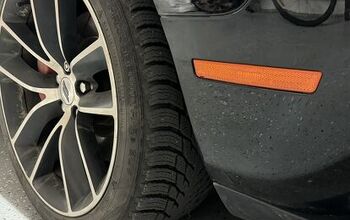GM Ready to Stem the Flow of Old Pickups, Just Not Quite Yet

Production of crew cab and double cab variants of GM’s full-size 2019 pickups is already underway, but the automaker won’t fully turn off the taps on the older-generation models until after the middle of next year.
GM provided a run-down of its pickup production plans Wednesday, assuring those who aren’t fans of the new Silverado’s styling that there’ll be a toned-down alternative available for some time.
According to chief financial officer Dhivya Suryadevara, via Automotive News, production of the older K2 Silverado and GMC Sierra crew cabs will cease early next year, with double and regular cab models wound down starting in the “early second half” of 2019.
Production of new-generation (T1) pickups kicked off with the crew cab version at GM’s Fort Wayne, Indiana plant in July, with double cabs models coming online in October. Starting in January, the company’s Mexican truck plant will begin assembly of regular cab models, in addition to more of the all-important crew cabs.
Suryadevara said, without actually saying it, that the roll-out of new pickups was in no way similar to the botched launch of Ram’s next-gen 1500. Some 45,000 next-gen GM full-sizers found buyers in the third quarter of 2018, she said.
GM credits the successful concurrent production of both models on a train of unfinished double cab trucks sent to GM Canada’s Oshawa plant for final assembly. Known as the “Oshawa shuffle,” the transfer of some older-gen trucks across the border frees up capacity at Fort Wayne. While already tasked with building the Cadillac XTS and Chevrolet Impala, Oshawa’s pickup line got a boost last summer with the arrival of heavy-duty models in need of final assembly. A second shift was announced in June.
It’s good times for a plant once feared to be on the verge of closure. That said, the phase-out of the older-gen trucks will undoubtedly lead to a decreased need for hourly workers. Kim Carpenter, a spokeswoman for GM, told Automotive News that the older-gen final assembly program is expected to “run into late 2019 based on market demand.”
[Image: General Motors]

More by Steph Willems
Latest Car Reviews
Read moreLatest Product Reviews
Read moreRecent Comments
- 2ACL If your driving and/or maintenance regimen wrecked the valves, what other horrors await me? A maintained 2.slow can be decent basic transportation, though many of the models carrying it are old enough to have age-related problems. This is impending heartbreak for anyone not intent on getting their hands dirty.
- Theflyersfan If cutting costs (which usually means cheaper parts and materials) is their plan of attack, all the while dealing with millions of cars recalled and with serious quality issues, I think staying away from Ford is the best thing possible. When you hack and slash away like that, it tends to be a race to the bottom. (See: Nissan and Mitsubishi. )How about, instead, focusing on what is breaking and forcing expensive recalls and emergency service bulletins because it always costs more to fix it after the fact. And then the reputation can be improved and you can charge $100,000 for a pickup without a guilty conscience.
- EBFlex Translation: “We want to lower quality even more”How about stop with the EVs that nobody wants and is a dead end road and invest that into making quality vehicles?
- Jeff Agree but manufacturers in the US have discontinued manuals on most vehicles and eventually discontinue all manuals. The problem is that most vehicles made today have computers controlling most functions in vehicles. HVAC, power steering, power brakes, parking brakes, transmissions, and many other functions that were manual and now electronic. The mechanical functions were easier to repair and more reliable. The Maverick has a lot less technology than many of the newer vehicles at least you can control lights, temperature, and radio without going through a screen but compared to past vehicles I have owned it has more technology than I want or need.I am not looking forward to these recalls as a Maverick owner but I will get them taken care of. I do not like the trend toward mechanical functions that have worked well for decades being controlled through a computer function or CANBUS. It is cheaper for the automakers to buy preassembled components reducing time on the assembly line but it makes it more expensive to work on and the parts are usually more expensive. Hoovie and the Car Wizard have some good videos on the difficulty of working on most modern day vehicles and the increasing expense of replacement parts.
- Funky D I have pretty much my entire music collection on my phone (72 GB) worth, so I always have something to listen to when I don't want to stream SiriusXM.

































Comments
Join the conversation
After too many decades, Chevy finally appears to be successfully emulating Honda. Not in quality, of course, but that its newest models make the preceding versions look far more attractive.
I had a 99 Silverado which was the first year of that generation. I'd suggest you skip it, let them get the bugs out. Bonus for saving some money.